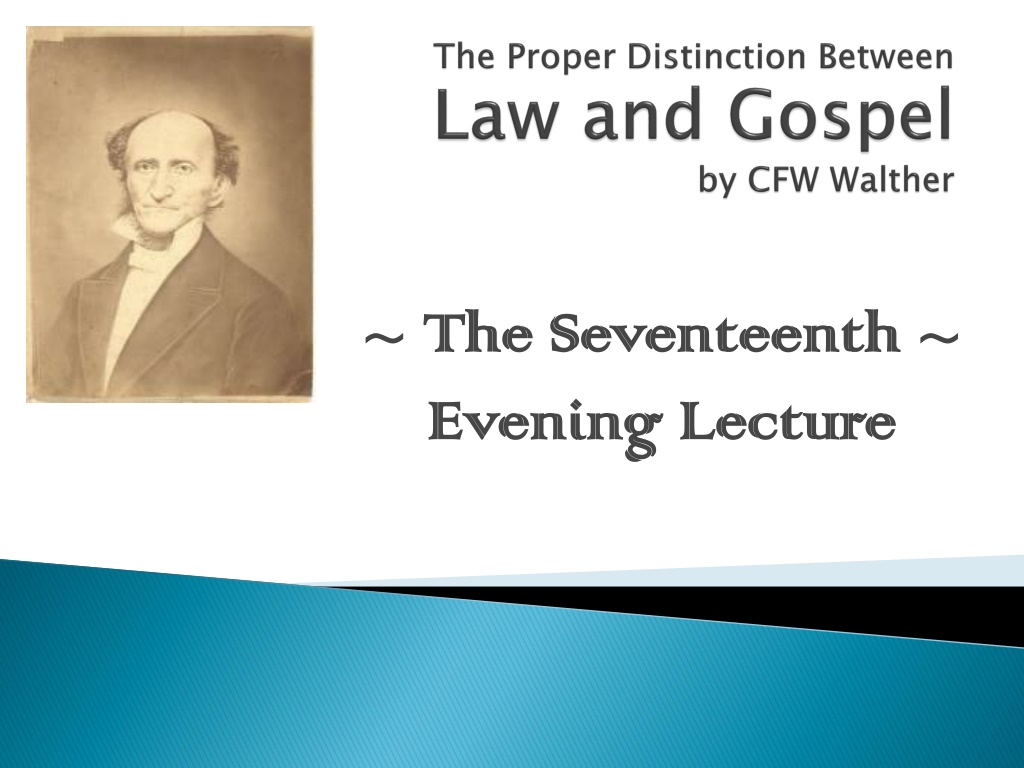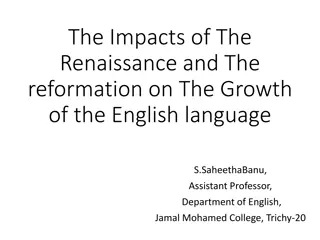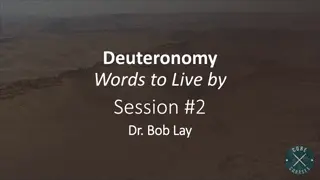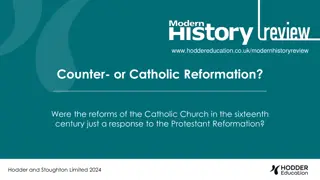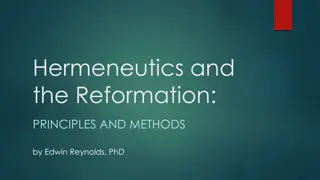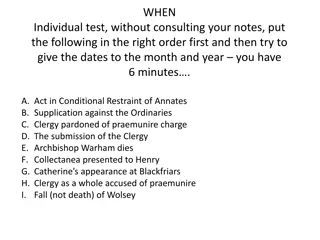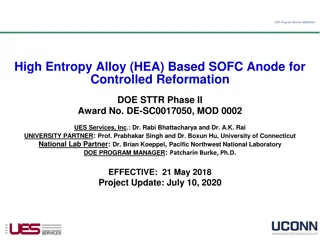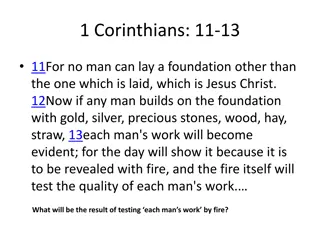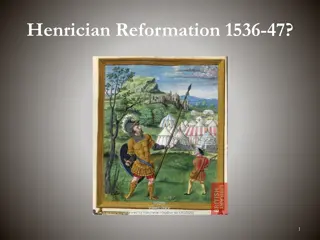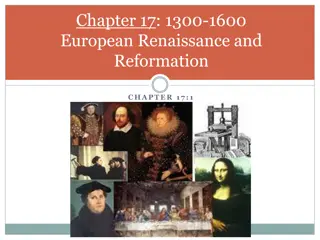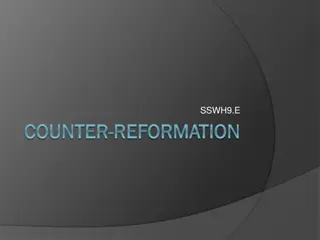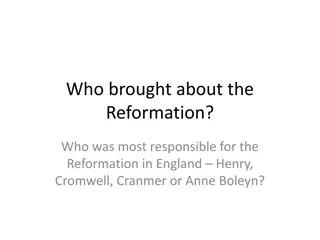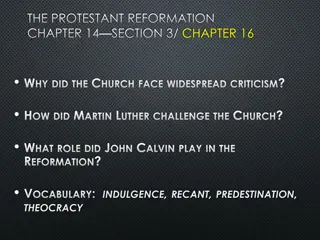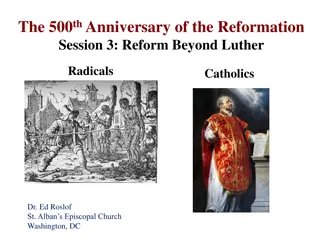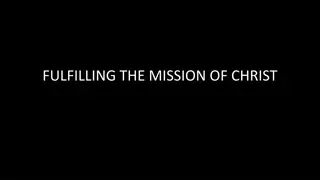Unveiling the Reformation: A Journey Through Historical Teachings
Delve into the historical teachings of the Reformed sects, exploring concepts of forgiveness, sacraments, the Word of God, and the Marburg Colloquy. Discover contrasting perspectives on grace, prayer, and the Lord's Supper, reflecting on the spirit of faith and submission to the divine Word that defines distinct church movements.
Download Presentation

Please find below an Image/Link to download the presentation.
The content on the website is provided AS IS for your information and personal use only. It may not be sold, licensed, or shared on other websites without obtaining consent from the author. Download presentation by click this link. If you encounter any issues during the download, it is possible that the publisher has removed the file from their server.
E N D
Presentation Transcript
~ The Seventeenth ~ ~ The Seventeenth ~ Evening Lecture Evening Lecture
We rely on the Means of Grace to bring us forgiveness. But the Reformed say My sins are not forgiven except Except when? John Calvin most eloquently expressed the false teachings of the Reformed sects. But who was the earlier teacher from whom all false teachings of the Reformed churches have sprung ? St. Augustine (354 430 A.D.) had a good saying about the sacraments. What was it? 2
In the fifth place, the Word of God is not rightly divided when sinners who have been struck down and terrified by the Law are directed, not to the Word and the Sacraments, but to their own prayers and wrestlings with God in order that they may win their way into a state of grace; in other words, when they are told to keep on praying and struggling until they feel that God has received them into grace. 3
The Marburg colloquy. But the movement was brought to a halt at the discussion of the doctrine of the Lord s Supper. The Swiss, indeed, offered to speak like Luther concerning the Substantial presence of the true body and the true blood of Christ in the Lord s Supper, only they would understand by that a spiritual presence. 4
Yours is a different spirit from ours. (German: Ihr habt einen andern Geist als wir) 5
the spirit of childlike simplicity which takes the Father in heaven by His words. the spirit of faith, the spirit that submits to the Word of God and takes human reason captive. The spirit of the Zwinglian, Calvinist, and unionistic churches is nothing else than the rationalistic spirit. 6
The characteristic mark of our Church is unquestioned submission to the divine Word. Sectarian teachers are continually tossed about like the waves of the sea and betray the fact that they are not founded upon the rock of the Word of God. 7
This is evident, in particular, from their rejection of absolution as pronounced by the minister from the pulpit, or in general and private confession. They assert that the worst papistic leaven and the most abominable remnant of the Papacy in the Lutheran Church is absolution. 8
In a case of necessity even a layman absolves and becomes the minister and pastor of another. 9
Not only may I do this, I am ordered to do it. If I fail to do it, I am a servant of Moses and not a servant of Christ! 10
Every Christian, male or female, adult or child, is commissioned to do this. Even a child s absolution is just as certain as the absolution of St. Peter. 11
than communicate to him the intelligence that Christ has interceded for him in his sorry plight and that God has restored him to favor. 12
If some one commissions me to tell So-and- so that he has forgiven him, and I execute the commission, the forgiveness is just as valid and effective as if the party himself were to deliver it. Your friend would certainly accept the information as reliable. That is what happens at absolution. 13
1. confessio oris (oral confession); 2. contritio cordis (heartfelt contrition); 3. satisfactio operis (compensation for wrong done by the performance of some good work). 14
1) from the perfect reconciliation and redemption of Christ; 2) from the command of Christ to preach the Gospel to all men, which means nothing else than to absolve all men, to assure them of the forgiveness of their sins. At absolution we say nothing but what has happened. 15
Yes! Indeed, that is what God requires, and the person is in duty bound to believe this or lose the salvation of his soul. the Gospel is nothing else than absolution. 16
Poor sinners were admonished that they must feel a genuine contrition, that they must be really crushed, and that they must frame really good resolutions. But they were not told to come even if they could hardly crawl, even if they had to confess themselves the worst sinners, and to believe that the door of grace was open to them and that they need only accept what was offered them. 17
There would be more Christians. For these facts do not make men secure, but quicken them to faith and a renewal of their lives. They begin to feel the great love that God has shown them and to rejoice because of His own free grace. He has taken from them all their sins and adorned them with the garment of Christ s righteousness. 18
The object of this petition is not to show that there is no forgiveness until we pray for it, but to remind us of the fact that it lies ready for us. This fact is to strengthen our faith. Similar to the fourth petition. 19
He has commanded His Christians to do this. Yea, He has ordained a peculiar office, the incumbents of which have nothing else to do than to keep on saying to men what Christ said to the paralytic. 20
infused grace the grace of God as it is demonstrated in the good works of believers. Grace cannot be infused into men, since it is the disposition of God outside of ourselves, in heaven. It can only be proclaimed to us. 21
An evangelical minister cannot open his mouth without pronouncing absolution! Mark you, I am speaking of a genuinely evangelical minister. A legalistic preacher cannot do this. 22
They will, as a natural consequence, go to the gallows. Not because grace has not been offered them, but because they would not accept it. 23
The priests are so accommodating as to impose on the people only a really trifling satisfaction, such as reciting ten Paternosters or putting a contribution into the alms-box, etc. By putting in a small contribution, the people imagine they have settled their account. Or they may be told to eat fish on a day on which they usually eat meat. All this is nothing but a diabolical humbug. 24
